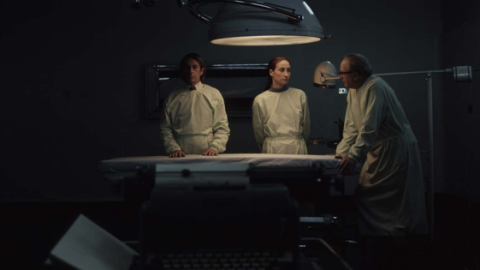Film of the Week: Neruda
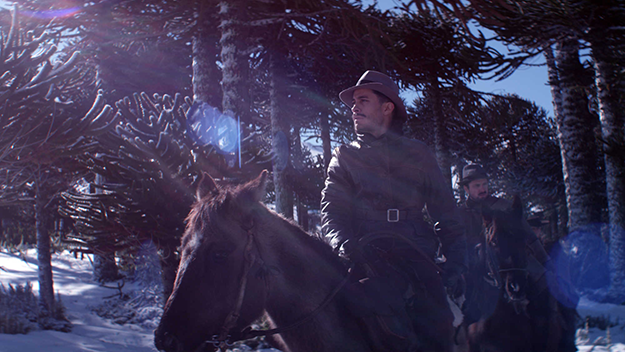
After watching Pablo Larraín’s Neruda, I’m not sure that I know much more about the film’s subject than I did before—and I knew next to nothing. I was aware that Pablo Neruda (1904-1973) was a Chilean poet, a Nobel laureate, and an icon of the left. I now know that he was a Communist senator who was driven into hiding when his party was outlawed; that he had to flee Chile by crossing the Andes; that he was famous, and much adored, for the exaggeratedly romantic manner in which he recited his poems in public; and that he had a penchant for fancy dress parties and cavorting naked with female admirers.
At least, I assume much of this to be true, but Neruda makes it hard to tell how much of it and to what degree, since this factually based fiction isn’t what you’d call a biopic in any conventional sense; it’s not even entirely clear to what extent it’s really about Pablo Neruda himself. Let’s say the film is about an idea of Neruda, and about the way that ideas about poets and political figures take root in people’s minds—not just in the minds of their admirers, but of their enemies too.
Larraín’s films have until recently been about Chile and its modern history, sometimes in stylized nightmare mode (Tony Manero, Post Mortem), sometimes in more familiar realist registers (The Club, docudrama No). This year, however, the director has pitched camp in the field of what you might call the anti-biopic, making two films about modern icons in which he doesn’t so much recount a life as contemplate a myth, and to some extent, the biographical subject’s own awareness of that myth. Jackie—Larraín’s first English-language film, premiered in Venice—is about Jackie Kennedy’s experience in the wake of Dealey Plaza, and about the moment when she realizes she is about to move off the center stage of history and into the wings.
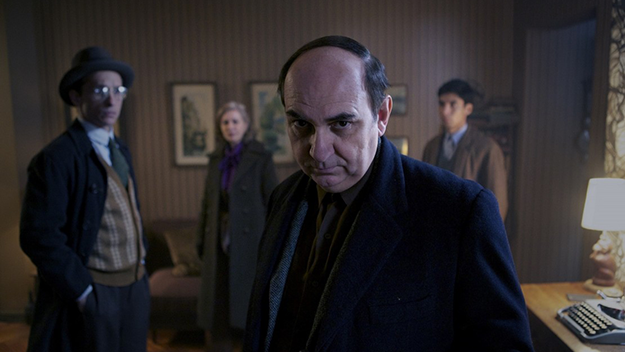
Neruda, unveiled in Cannes back in May, is a rather grander undertaking than the somewhat claustrophobic Jackie; you could even call it grandiose, as befits its central figure. The film covers a brief period in Neruda’s life—from the moment in 1948 when Communism is proscribed in Chile and he is forced into hiding, to his escape into exile the following year. The action begins in what might seem the conventional mode for a film about a man of weight and moment. Neruda (a wonderfully droll, blustering Luis Gnecco) sweeps into a senatorial corridor of power, flashbulbs popping round him, and into a spacious room filled with august statesmen; his right-wing opponents fling sour comments at him, which he counters with peppery, defiant quips. There’s a definite touch of Citizen Kane about this flamboyant start, and it’s only after a moment that you wonder how much Larraín is indulging his penchant for borderline surrealism, as the room is at once a sort of stately council chamber and a men’s toilet, with urinals along the wall. Who knows, maybe such a room exists in the Chilean parliament, but it begins the film on a casually bizarre note that makes you wonder about the veracity of what follows.
For example, did Neruda and his wife Delia del Carril really throw such orgiastic parties? The well-heeled bourgeois bohemians of their circle let their hair down in wild nights of salsa, semi-nudity, and fancy dress, at which Neruda charms the crowd by performing—clearly his standard party routine—his greatest hit, the love poem “Tonight I can write the saddest lines.” He’s a ludicrous apparition, a portly middle-aged man with kohl-lined eyes, dressed in the white robes of Lawrence of Arabia, and laying on his famous quavering “poet’s voice,” the one that never fails to make hearts pound. “Many women,” comments the voiceover narrator, “must think he makes love with a rose between his teeth.”
It’s this voiceover that makes us so uncertain whether we’re seeing a real Pablo Neruda, or an observer’s half-besotted, half-vengeful distortion of him. The narrator, who eventually reveals himself a few episodes in, is Oscar Peluchonneau (Gael García Bernal), a policeman ordered by his superiors to apprehend and humiliate the poet, following the ban on Communism—a ban directly ordered, Peluchonneau states, by the U.S. government. It may be that the opening scenes of Communist debauchery are actually in the mind of Peluchonneau, a man employed to discredit Neruda, and perhaps already working on making him look absurd in our eyes.
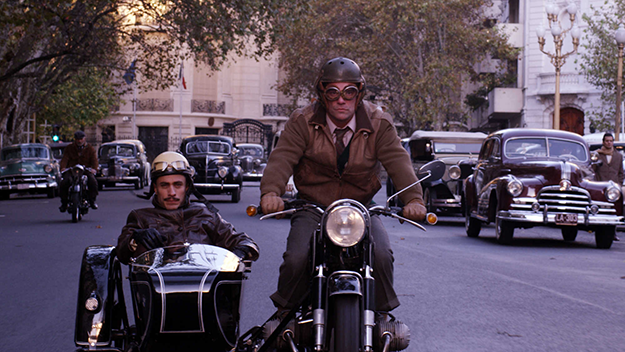
Take Peluchonneau out of the equation, and this episodic drama—scripted by Guillermo Calderón, Larraín’s co-writer on The Club—offers a fairly linear account of Neruda’s career as outlaw. It shows him and Delia attempting to cross into Argentina, but being turned back because of confusion over the poet’s nom de plume and the birth name on his passport, Ricardo Reyes Basoalto. Then we see the couple moving from their luxurious home into a cramped apartment where Delia, an Argentinian aristocrat, finds proletarian domesticity not to her taste (when she complains about cleaning the place, a follower offers her a pair of rubber gloves; she grandly sniffs, “Hygiene is a bourgeois value”). Neruda sometimes emerges from hiding, at one point dressing as a priest to sneak out to a brothel, and in a later visit, donning drag, Falstaff-style, to escape a police search. In the background, Chilean history takes its course; we see brutal round-ups of leftists and a prison camp commanded by a young military officer, one Augusto Pinochet.
Throughout it all, the Nerudas cut a swagger. Despite Pablo’s philandering narcissism, Delia (played as a stately, tender survivor by Mercedes Morán, from The Holy Girl) is clearly in love with him. The prospect of being on the run with him, as if in a romantic novel, visibly excites her, although the reality becomes somewhat different: “You suffocate me all day,” he moans, “I used to be a prince.” Meanwhile, Pablo continues to twit his enemies; no longer able to defy the reigning powers face to face, he drives past the presidential palace at night beeping his horn to spoil the sleep of President González Videla (played with snakelike sourness by Larraín’s acteur-fétiche Alfredo Castro). There’s also an extraordinary sequence in which Neruda dresses in a white suit and broad-brimmed hat, to pass as a Central American visitor; walking in the street, he hugs an impoverished street kid. The scene seems to offer a sentimentalized image of the great man’s compassion, but there’s a bleak twist; the next scene shows the waif wearing Neruda’s white jacket, but interrogated by police.
While the film never makes us doubt that Neruda is a great poet and a politician of true conviction, nevertheless he also emerges as a self-serving, self-mythologizing, perpetually randy buffoon. The film plays poignantly on the disconnection between the demon-lover persona that he creates in his verse, and the physical reality of a dumpy middle-aged man with an ill-advised comb-over. It’s not that Neruda’s looks discredit the persona, but it is suggested that they made him all the more narcissistically attached to it, and to an act that worked rather well both for Delia and for Pablo’s many admirers, public and private.
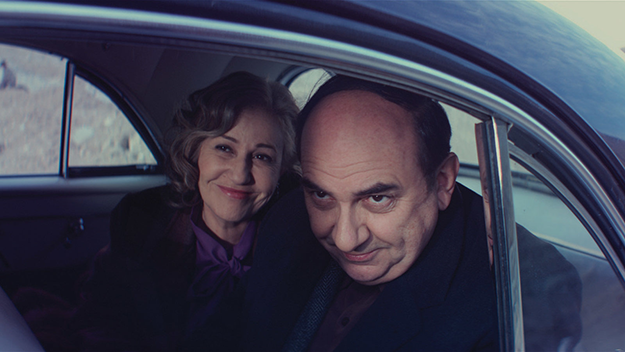
So much for the portrait of the artist—but beyond that, the film is a portrait of the policeman on Neruda’s trail, his arch-enemy and perhaps arch-fan. Neruda depicts a parodic Holmes-Moriarty relationship between the detective and his quarry: the poet taunts Peluchonneau by leaving him a trail of paperback thrillers to puzzle over. But Peluchonneau is himself a dime-novel detective, in that he doesn’t really exist. Here’s the film’s boldest touch: the fact that Peluchonneau is manifestly a fictional figure. Not only is the character a pure invention, but he’s aware of himself as an invented character, and ultimately has to accept that he is Neruda’s creation. Every fugitive needs a pursuer; the poet has created his own imaginary nemesis, the figure who will make Neruda’s escape look truly heroic by dogging his trail till the very last.
Peluchonneau is as preposterous a figure as his prey—a self-described “trained monkey” constantly humiliated by his superiors, and agonized by the thought that his prostitute mother may not, after all, have been impregnated by the legendary police chief from whom he takes his fancy surname. Played by Bernal, the fedoraed, pencil-mustached cop is certainly dashing, and sees himself as no less a love god than Neruda; he even gets into a clinch with the poet’s first wife, or thinks he does, for this scene may be entirely in his imagination. He pursues Neruda on a bike that runs out of fuel, wearing a cartoonishly penile cycle helmet; and yet the film finally grants him a moment of self-conscious nobility, a redeeming apotheosis in which he more or less becomes real at last.
It’s a premise straight out of Jorge Luis Borges, the idea that the detective creates his own prey and vice versa. “I dream of him, he dreams of me,” Neruda comments, and it is suggested that the relationship is altogether homoerotic (Peluchonneau absurdly denounces Neruda on live radio as “a public menace and an unforgettable lover”). Delia unequivocally tells Peluchonneau as much in an extraordinary sequence in which a single continuous conversation keeps cutting between two different setups and styles of lighting—characteristic of a highly fragmented, episodic film in which Larraín and regular DP Sergio Armstrong use back projection and other devices of stylization to defuse expectations of a reliable historical drama.

Larraín arguably overplays his card in the final section; the snowbound pursuit is overstretched, and the film’s self-reflexive dimension overstated by Peluchonneau’s too-prolix commentary. But despite the mocking tone, the film’s melancholic grandeur is maintained throughout, not least through a hauntingly austere soundtrack that mixes Federico Jusid’s score with passages of Charles Ives, Edvard Grieg, Gavin Bryars, Penderecki, and the latter’s dedicated hommagiste Jonny Greenwood. It’s a film of unsettling looseness and dreamlike fluidity that, at moments, recalls another Chilean master of cinematic uncertainty, Raúl Ruiz. And, while its tricksiness may set some viewers’ teeth on edge, it’s a film that’s very congruent with a tradition of self-reflexiveness in Latin American literary fiction. Think of it not as a movie about Pablo Neruda, but as an experimental novel masquerading as a movie about Neruda, and this film begins to make a bold, perverse kind of sense.
Jonathan Romney is a contributing editor to Film Comment and writes its Film of the Week column. He is a member of the London Film Critics Circle.



